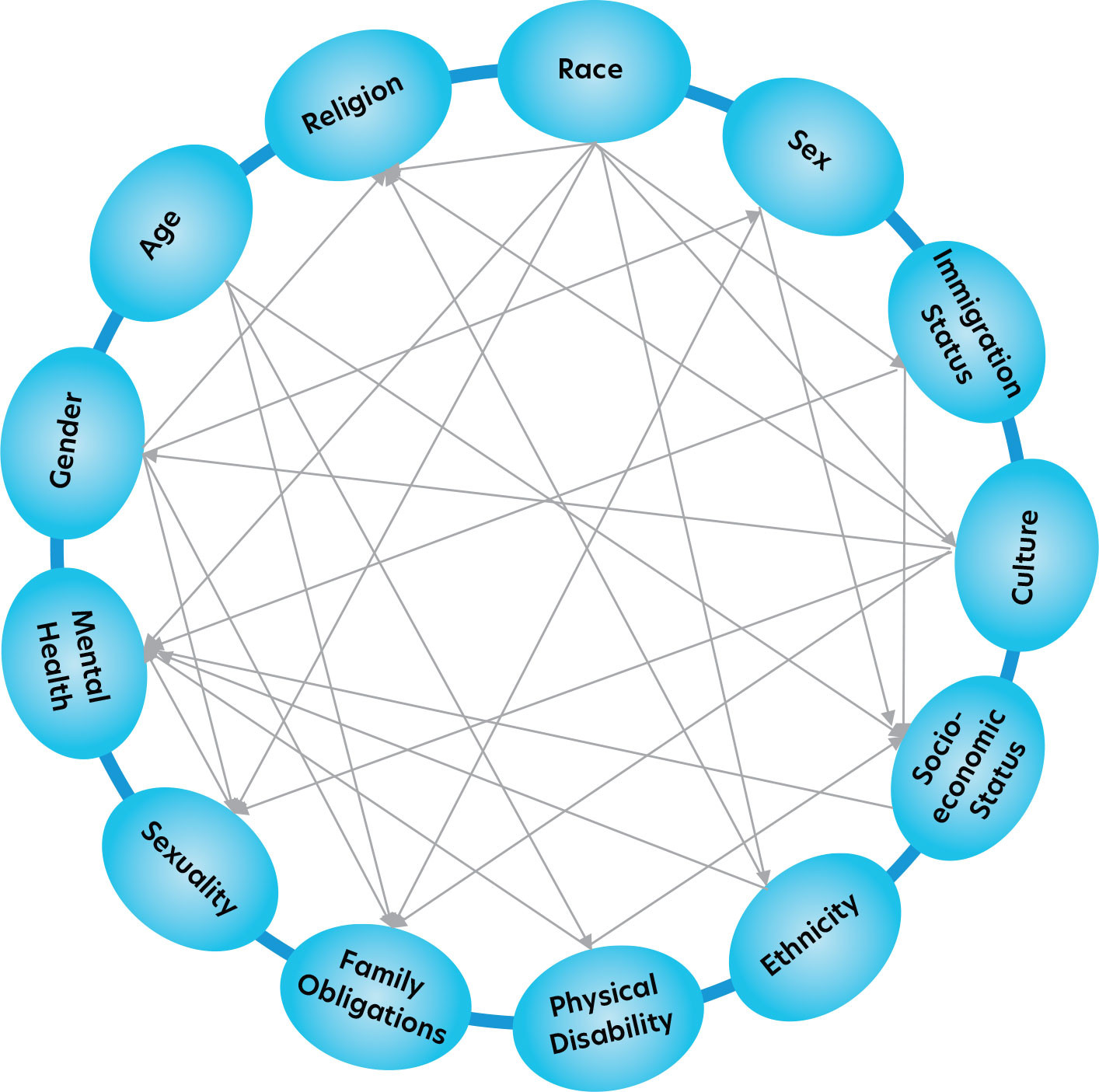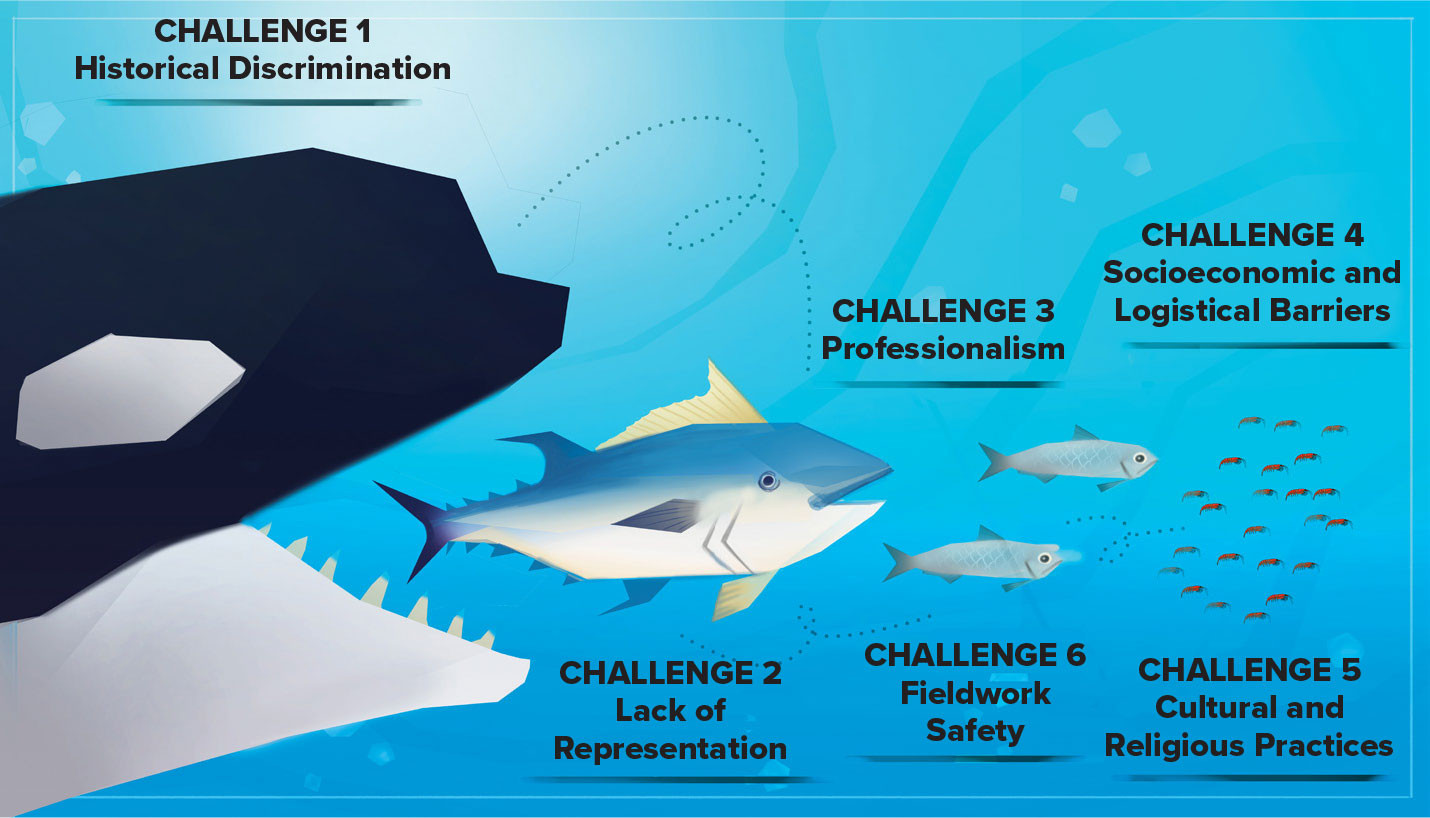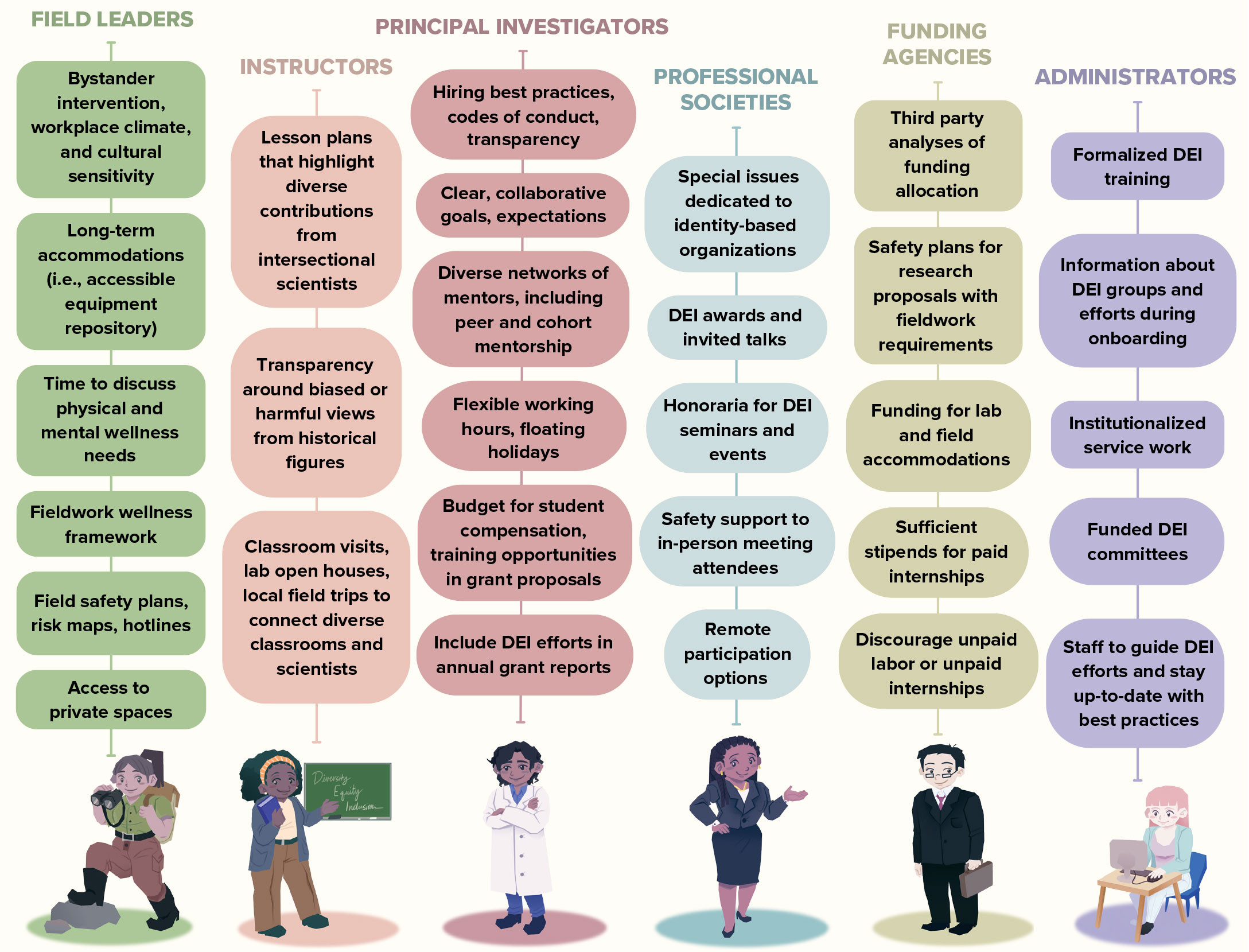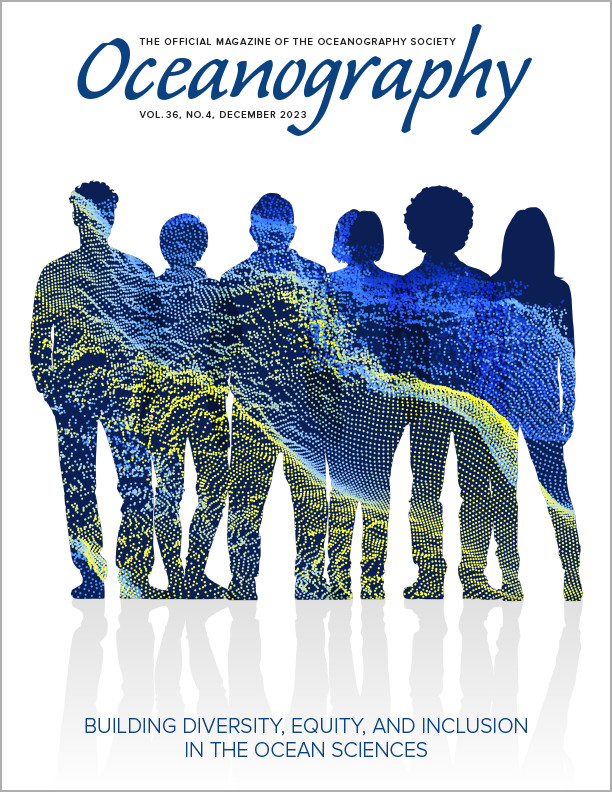Introduction
Ocean science has a legacy of excluding and exploiting Black, Indigenous, and people of color, LGBTQIA+ people, disabled and neurodivergent people, low-income people, people from non-Western cultural/faith traditions, and immigrants (Murphy, 2016; Riegle-Crumb et al., 2019; Hardy and Rozwadowski, 2020; Graham et al., 2022; Legg et al., 2023). This exploitation has created oceanography’s diversity deficit, where the demographics of oceanographers do not match the global diversity of people impacted by ocean processes. This lack of diversity within oceanography is part of a negative feedback loop in which the lack of representation pushes emerging, innovative oceanographers away from a largely homogeneous field.
In this paper, we use diversity to refer to cultural, racial, religious, age, gender, sexual orientation, neurodivergence, and disability identities, and use minoritized or marginalized interchangeably to refer to groups historically and presently excluded on the basis of their identities. Furthermore, individuals operate under multiple racial, cultural, gender, and physical identities, and the challenges faced by people holding multiple marginalized identities are often overlooked (Figure 1; Crenshaw, 1994). In Figure 1, this concept is represented as a web matrix in which diverse identities connect with and influence one another, with implications for how unique combinations of identities can compound individual challenges. Intersectionality permeates every facet of daily life, from interpersonal interactions to systemic discrimination. Effective diversity, equity, and inclusion (DEI) practices in oceanography must acknowledge, accept, and support multifaceted experiences.

FIGURE 1. Individuals operate under a multitude of different racial, cultural, sexual, and physical identities. This intersectionality can create overlapping and interdependent layers of disadvantage and discrimination. The unique web of identity held by an individual will determine how and to what degree that person experiences the enumerated challenges. > High res figure
|
Oceanography’s history has culminated in a vast underrepresentation of marginalized groups (Garza, 2021), causing oceanographers to call for increased DEI efforts. Gender equality efforts have been successful over the last few decades (Whittaker and Montgomery, 2014; Morris and Washington, 2018; Gray et al., 2020), with women making up almost 39% of oceanographic researchers today (Legg et al., 2023). However, participation for other underrepresented groups in ocean science has remained low. Systemic racial disparities in National Science Foundation funding rates have actually worsened in the past decade (Chen et al., 2022), and advances in gender equality diminish at advanced career stages (e.g., female geosciences faculty = 50% assistant, 22% full professor; Ranganathan et al., 2021). Beyond entry and attrition, extensive challenges remain for marginalized people who persist in oceanography, manifesting as disparities in scientific citations (Cite Black Women, ND), funding (Chen et al., 2022), and space allocation (Wadman, 2023). Science’s lack of diversity also comes with epistemic biases, in which we know proportionally less about certain topics based on who is allowed to participate in generating knowledge and testing questions (Kozlowski et al., 2022; Raja et al., 2022). Glaring disparities and biased approaches highlight the need for rapid, transformative action in the oceanographic community to address the field’s diversity deficit.
Authors’ Positionality
We, the authors, are diverse in our relationships to oceanography and in our identities. We are graduate students, immigrants, naturalists, disabled people, postdoctoral researchers, queer people, Muslims, biologists, people of color, international students, people whose families filed for bankruptcy, field leaders, science educators, Black people, principal investigators (PIs), ecologists, and undergraduates. We do not claim to represent everyone; no monolith exists to describe a universal experience. We do represent the diversity of possibilities that arises within a team of transdisciplinary oceanographers across institutions, career stages, and life experiences. We share a belief that oceanographers should be able to bring their full identities to their research. We wish to use our privilege to provide actionable solutions for fostering diverse oceanographic communities. Most of all, we hope that this article will inspire people to bring their perspectives, experiences, and ideas to their sphere of influence so that we can collectively shift the culture of oceanography.
Challenges, Scenarios, and Solutions
We present six challenges faced by oceanographers with marginalized identities (Figure 2). For each challenge, we provide an example scenario and identify potential solutions. Many of the challenges are intersectional, and solutions may be overlapping. In Figure 2, the six challenges are represented as a food chain in which “everyday” challenges support the persistence of bigger, systemic ones. For example, neglecting safety (Challenge 6) perpetuates a lack of representation (Challenge 2), without which systemic oppression cannot survive and thrive (Challenge 1). A list of specific and actionable recommendations for field leaders, instructors, mentors, PIs, professional societies, funding agencies, and institutions is available in the online supplementary materials and are visualized in Figure 3.

FIGURE 2. A visual representation of the challenges outlined in the paper as represented by a food chain. The “everyday” challenges allow the bigger ones to persist in a food web—that is, neglecting safety perpetuates a lack of representation, which feeds the larger systemic oppression. > High res figure
|

FIGURE 3. Tools and practices that can support diversity, equity, and inclusion (DEI) efforts across career stages and types, from individuals (field leaders, instructors, and principal investigators) to institutions (professional societies, funding agencies, and administrations). See the online supplementary materials for detailed suggestions, tools, and resources for each group. > High res figure
|
Challenge 1: Historical Discrimination Underpins Day-to-Day Challenges
Oceanography and other STEM fields have a long and complicated history with racism and discrimination (Norrgard, 2008; Saini, 2019; Berhe et al., 2022). These histories are not always acknowledged, and the lack of familiarity with this context can lead to alienation for marginalized oceanographers, especially early career researchers, ultimately perpetuating oceanography’s leaky pipeline (Berhe et al., 2022).
SCENARIO. A first-year PhD student in a prestigious oceanography department signs up for the introductory seminar class and notices that the instructor has assigned a reading about the “father of oceanography,” Matthew Fontaine Maury. The student discovers in a quick internet search that Maury was a proponent of employing science to support American expansionism, including upholding the institution of slavery (Hardy and Rozwadowski, 2020). As a Black person, the student hopes for a nuanced discussion of Maury’s contributions, but the instructor glosses over the topic, calling Maury “a product of his time.” As the only Black student in the cohort, the student struggles to decide whether it is worth the emotional labor to bring this up with the instructor. The student ends up feeling jaded and dismissed and is less likely to participate in class.
SOLUTIONS. Instructors and leaders must recognize and acknowledge the darker sides of foundational Western science (Cronin et al., 2021; Pico et al., 2021; Kitchens and Coop, 2023). While it is not practical to remove controversial papers altogether, they should be accompanied by nuanced discussion that does not ignore or excuse discriminatory practices. Instructors should also make an effort to diversify their syllabi and include foundational works from marginalized scientists. Beyond the classroom, professional societies should advertise to and invite participation from diverse groups—for example, journal articles dedicated to identity-based organizations. Thoughtfully spotlighting the work of marginalized scientists requires giving speakers the latitude to decide what aspects of their identities, science, and DEI work they prefer to highlight. Funding agencies should publish overviews of funding allocation and encourage third-party analyses. Administrators, departments, and PIs should seek to formalize DEI training for all group members.
Challenge 2: Lack of Representation and Community, and the Strain of Silent Work
A lack of visible role models can make it difficult for early career individuals to envision their professional potential. Those who persist despite these challenges face the added burdens of silent work—work in service of the prevailing culture that is not directly acknowledged in formal job descriptions and is therefore not considered for promotion, reviews, and other forms of career advancement. Moreover, service imposed by colleagues or supervisors perpetuates the notion that minoritized individuals are responsible for change.
SCENARIO. An Indigenous postdoctoral scholar struggles juggling her multiple identities and responsibilities as a researcher, Tribal Member, and mother. Because she has previous experience with DEI and outreach, her supervisor suggests that she create outreach materials for a DEI event for a large oceanography conference. Later that day, a staff member on the DEI committee asks if she is willing to help plan a department celebration for Indigenous Peoples’ Day. These well-intentioned, back-to-back requests, combined with increased duties at home while her children are on fall break, leave her feeling unsupported and isolated.
SOLUTIONS.While it is crucial to acknowledge the value of minoritized individuals’ experiences and insights, it is equally important not to place the responsibility of representing the oceanography community on a single marginalized individual. Avoid unintentional pressure by asking for broad participation instead of targeting individuals with requests, particularly if someone has not previously expressed an interest in the task. PIs should set clear and collaborative progress goals and, where relevant, probation and tenure expectations to avoid miscommunications and misaligned expectations (Macdonald, 2020). Funding agencies should acknowledge, value, and require reporting on DEI initiatives performed by funded scientists, and require researchers to share benefits with local communities. Administrations have the ability to establish and fund DEI committees to provide centralized resources for departments, labs, and individuals. These resources should institutionalize service work to alleviate the burden of silent work, include DEI and service work in job descriptions and contracts, and hire trained staff to guide DEI efforts and stay up-to-date with best practices.
Challenge 3: Marginalized Identities Are Seen as Unprofessional
The prevailing standards of professionalism in science represent the dominant culture (White, cisgender, heteronormative, able-bodied, and male; Gray, 2019). Certain types of clothing (e.g., turbans or hijabs), hairstyles (e.g., afros, braids, or dreadlocks), body types (e.g., obese; Haney et al., 2021), and behaviors (e.g., feminine or gender-nonconforming) are seen as unprofessional in the work environment (Harrison-Bernard et al., 2020), compelling individuals to engage in code switching by adjusting their speech, behavior, names, or appearance (Kim et al., 2019; McCluney et al., 2021; Allen and Stewart, 2022; Ock, 2022; Spencer et al., 2022; Traylor-Knowles et al., 2023).
SCENARIO. A new cohort of PhD students is doing a round of icebreakers with faculty and staff. The cohort is mostly White, although there are two Black students. In front of the entire group, one professor casually asks if the two Black students know how to rap. Nobody responds, although everyone is clearly uncomfortable. Later, the two students debrief and agree on the implication: “You don’t belong here—why aren’t you off rapping somewhere?” The silence of their cohort makes them just as uncomfortable as the comment itself. They share a concern that this incident might be a warning sign that their scientific ideas won’t be taken seriously by others in the department.
SOLUTIONS. Obligatory sensitivity training in laboratories and field sites is an effective way to combat microaggressions in research spaces. Ideally, such training should involve facilitated discussions among peers. Field leaders, instructors, and PIs should take reports of incidents seriously and make it clear to department leaders that these behaviors are unacceptable. Instructors and field leaders can challenge existing stereotypes by highlighting oceanographers who fall outside the dominant culture. They can make research experiences more welcoming by using tools such as hiring best practices, codes of conduct, and transparency (McGill et al., 2021). PIs should dedicate time during work hours for DEI training, discussion, and reading (Chaudhary and Berhe, 2020). Advisors should also encourage mentees to develop a diverse network of mentors, including peer-mentorship and cohort relationships (Mondisa and McComb, 2015; Traylor-Knowles et al., 2023). Mentors should establish regular check-ins to monitor a mentee’s well-being and share resources.
Challenge 4: Socioeconomic and Logistical Barriers Limit Participation
Oceanography often requires specialized professional training, from computational skills (e.g., programming) to field skills (e.g., scuba diving). The education and equipment required to earn a scientific diving certificate, for example, can require thousands of dollars and several months of training (Lang et al., 2006; Barber et al., 2023, in this issue), and marginalized students may be forced to forgo expensive or unpaid training opportunities or internships (Zavaleta et al., 2020; Kreuser et al., 2023).
SCENARIO. A first-generation undergraduate majoring in ocean science with no prior swimming or scuba training is told that all undergraduate research opportunities in the department will be given to certified divers. The student wants to be a professor one day, so she looks up the cost of scuba and scientific diving certifications. She immediately knows that she can’t afford the $2,000 price tag—she already works several on- and off-campus jobs to pay for rent in her expensive college town and to send money home to her family. As she watches her peers go through the training, she feels isolated and considers switching majors to have a better chance at getting experience.
SOLUTIONS. Institutions and departments can offer financial aid and career assistance for students seeking paid opportunities in the ocean sciences whenever possible. PIs can include budget line items for student compensation, conference travel, professional development, and lab training opportunities in grant proposals. Funding agencies should consider prioritizing proposals that utilize paid labor (Fournier and Bond, 2015; Kreuser et al., 2023). Mentors and leaders should allocate sufficient time to individuals who wish to receive training and make accommodations for those who cannot participate due to physical or other limitations. They can also advocate for recognition of silent work and DEI engagement during personnel reviews and conversations with administrators, and they can financially and professionally support students, field leaders, and instructors as they undertake DEI initiatives.
Challenge 5: Ignorance of Non-Dominant Cultural or Religious Traditions
Religious and cultural discrimination represent a “neglected diversity dimension” (Gebert et al., 2014) that can lead to hostile workplace cultures (Schneider et al., 2022). In much of the West, the predominant culture is rooted in Judeo-Christian traditions, such as the Saturday-Sunday weekend that centers around Judeo-Christian holy days (Cross, 1990). Individuals in non-dominant faith groups are left to educate their colleagues, advocate for accommodations, and sometimes sacrifice research opportunities that conflict with religious obligations.
SCENARIO. A Muslim undergraduate is excited to start a summer internship working aboard a research vessel. Ramadan falls during four weeks of the 12-week internship. The demands of ship-based fieldwork while abstaining from food and drink from sunrise to sunset are difficult, so the student lets the supervisor know that this is a difficult time. Out of fear of liability, the supervisor tells the student not to participate in fieldwork while fasting. The student is shocked and unsure of how to proceed but decides to hide fasting from the supervisor and overexerts themselves to avoid letting religion “get in the way of research.” At the end of the summer, the student feels exhausted, demoralized, and hesitant to share religious obligations with supervisors and colleagues for fear of missing out on opportunities.
SOLUTIONS. Ensure individuals feel safe and encouraged to observe their cultural and religious obligations. This includes giving individuals the leeway to meet their requirements without legal, physical, or psychological risk. Individuals should be given the space to participate in field research requirements at their own pace and terms, especially when observing traditional religious practices such as those required during Ramadan (e.g., fasting, stopping for prayer). With cultural and religious differences, mentors should be flexible regarding requirements for field experiments, seasons, and sites. Accommodations can be offered through flexible working hours for mentees who are, for example, participating in religious fasts, caring for children, or living with health conditions. By implementing “floating holidays,” where individuals can take days off for significant personal or spiritual obligations, and allowing people to choose which five days of the week to work, they can meet regular obligations with their communities. As students may not know how or feel empowered to disclose accommodations they may need, PIs and field leaders are ultimately responsible for creating space and structure for these important pre-field season conversations. Cultivating a community in which participants have opportunities to openly and comfortably communicate with field leaders is the best way to ensure that both parties’ needs can be met, especially when intense field seasons and personal obligations coincide.
Challenge 6: Fieldwork Can Be Uniquely Dangerous
Safety is a major concern for marginalized field scientists, particularly for oceanographers who work in isolated field settings (Clancy et al., 2014; Amon et al., 2022; McMonigal et al., 2023). Risks of mental and physical harm are compounded by fieldwork’s isolation, decreased privacy, reduced medical care, potential for hostile sociopolitical climates, and extended time with supervisors and colleagues (Demery and Pipkin, 2021; Matsuda, 2023).
SCENARIO. A queer, wheelchair-using researcher has been invited to participate in fieldwork in a foreign country. He is hesitant to attend because of the host country’s stance on LGBTQ rights, but his supervisor tells him that hiding his identity will be worth it for this important collaboration. After spending many hours preparing safety plans and researching available disability accommodations, the researcher asks the PI if the project has a medical emergency plan that can be adapted to his needs. The PI brushes it off, saying, “Nothing has ever happened before! You’ll be fine.” The researcher feels left in the lurch and anxious about the upcoming trip. He is angry and hurt that he feels obligated to sacrifice his safety for his career.
SOLUTIONS. Funding agencies can require inclusion of field safety plans (e.g., NSF Safe and Inclusive Working Environment plans) with research proposals that have fieldwork requirements. These plans should incorporate resources that address discrimination and harassment. To assure the safety of their teams, leaders should be aware of the potential risks associated with certain field locations while making plans. Leaders should research a region’s sociopolitical climate and advise field researchers to limit disclosure of identities to trusted individuals in unsafe environments. They might also consider informing local authorities of a field team’s research ahead of time to avoid unnecessary and potentially dangerous interactions with law enforcement. Field leaders and PIs should act as liaisons so that minoritized individuals are not the first line of communication with law enforcement. All field researchers should be aware of resources that improve safety for minoritized groups, including field safety plans, risk maps, and hotlines.
Conclusion
While the last few decades brought major research breakthroughs in oceanography, DEI initiatives have barely begun to dismantle barriers to including broader perspectives. The six challenges outlined in this article are rooted in historical injustices that acutely affect early career individuals who are building their networks, relying on letters of support, and experiencing job and financial insecurity. Our personal experiences and challenges with similar situations have instilled in us a deep belief that systemic change is possible if leadership and scholarship are reimagined. It is especially important for senior oceanographers to champion our recommended solutions and actively work to make space for diversity. As we push for more innovative approaches in our research, we must simultaneously push for initiatives that make oceanography safe, accessible, and equitable for diverse identities. By addressing the human dimension of our discipline, we can build a new legacy of transformative and inclusive oceanographic discoveries.
Acknowledgments
We express our deepest gratitude to the field leaders, instructors, mentors, professional societies, funding agencies, and administrators who have pushed the boundaries of equity and inclusion. We acknowledge our mentors, peers, and mentees who have faced the challenges described above and who generously shared their insights and experiences. We would like to extend special thanks to Erika Zavaleta, Lina Arcila Hernández, Rachel Meyer, Max Czapanskiy, and Conner Hale for their insight and feedback. We also thank Oceanography editor Ellen Kappel for her helpful and prompt suggestions. We look forward to working with all of you toward a future that allows each of us to reach our full potential.




